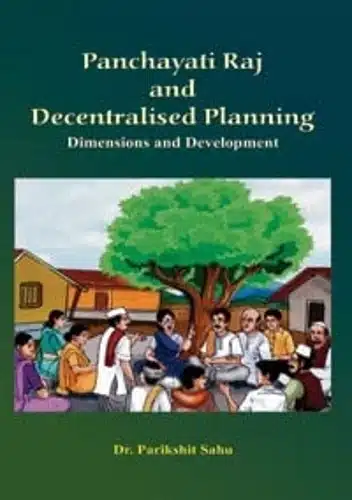
Save: 20%

Save: 20%
Panchayati Raj and Decentralised Planning: Dimensions and Development
Publisher:
| Author:
| Language:
| Format:
Publisher:
Author:
Language:
Format:
₹2,500 ₹2,000
Save: 20%
In stock
Ships within:
In stock
| Weight | 445 g |
|---|---|
| Book Type |
ISBN:
Page Extent:
“Panchayati Raj and Decentralised Planning: Dimensions and Development” by Parikshit Sahu is a comprehensive work that explores the intricacies of the Panchayati Raj system in India and its role in decentralized planning and local governance. This book delves into the various dimensions of Panchayati Raj and its impact on the development of rural and local communities.
Key features of the book may include:
1. Panchayati Raj System: The book likely provides an in-depth understanding of the Panchayati Raj system in India, which involves local self-governance at the village, intermediate, and district levels. Readers can expect to gain insights into the historical evolution of this system and its legal and administrative framework.
2. Decentralized Planning: Parikshit Sahu may discuss the concept of decentralized planning and how it empowers local bodies, such as Panchayats, to actively participate in the planning and implementation of development programs and projects. This approach is crucial for fostering grassroots development and addressing the specific needs of local communities.
3. Dimensions of Local Governance: The book is likely to explore the various dimensions of local governance, including the roles and responsibilities of Panchayats, their relationship with higher tiers of government, and the challenges and opportunities they face in delivering public services and improving the quality of life for rural populations.
4. Development Initiatives: Readers can anticipate a discussion of the development initiatives undertaken by Panchayats and how they contribute to the socio-economic progress of rural areas. These initiatives may include infrastructure development, education, healthcare, and poverty alleviation programs.
5. Case Studies: Parikshit Sahu may include case studies and real-life examples to illustrate how the Panchayati Raj system has been implemented in different states and regions of India. These case studies can provide practical insights into the successes and challenges faced by local governance institutions.
6. Policy Recommendations: The book may offer policy recommendations and suggestions for improving the functioning of the Panchayati Raj system and enhancing decentralized planning for more effective and inclusive development.
“Panchayati Raj and Decentralised Planning: Dimensions and Development” is a valuable resource for policymakers, scholars, development practitioners, students of public administration, and anyone interested in the dynamics of local governance and rural development in India. It sheds light on the pivotal role played by Panchayats in shaping the socio-economic landscape of the country and advancing the principles of participatory democracy and local self-governance.
“Panchayati Raj and Decentralised Planning: Dimensions and Development” by Parikshit Sahu is a comprehensive work that explores the intricacies of the Panchayati Raj system in India and its role in decentralized planning and local governance. This book delves into the various dimensions of Panchayati Raj and its impact on the development of rural and local communities.
Key features of the book may include:
1. Panchayati Raj System: The book likely provides an in-depth understanding of the Panchayati Raj system in India, which involves local self-governance at the village, intermediate, and district levels. Readers can expect to gain insights into the historical evolution of this system and its legal and administrative framework.
2. Decentralized Planning: Parikshit Sahu may discuss the concept of decentralized planning and how it empowers local bodies, such as Panchayats, to actively participate in the planning and implementation of development programs and projects. This approach is crucial for fostering grassroots development and addressing the specific needs of local communities.
3. Dimensions of Local Governance: The book is likely to explore the various dimensions of local governance, including the roles and responsibilities of Panchayats, their relationship with higher tiers of government, and the challenges and opportunities they face in delivering public services and improving the quality of life for rural populations.
4. Development Initiatives: Readers can anticipate a discussion of the development initiatives undertaken by Panchayats and how they contribute to the socio-economic progress of rural areas. These initiatives may include infrastructure development, education, healthcare, and poverty alleviation programs.
5. Case Studies: Parikshit Sahu may include case studies and real-life examples to illustrate how the Panchayati Raj system has been implemented in different states and regions of India. These case studies can provide practical insights into the successes and challenges faced by local governance institutions.
6. Policy Recommendations: The book may offer policy recommendations and suggestions for improving the functioning of the Panchayati Raj system and enhancing decentralized planning for more effective and inclusive development.
“Panchayati Raj and Decentralised Planning: Dimensions and Development” is a valuable resource for policymakers, scholars, development practitioners, students of public administration, and anyone interested in the dynamics of local governance and rural development in India. It sheds light on the pivotal role played by Panchayats in shaping the socio-economic landscape of the country and advancing the principles of participatory democracy and local self-governance.
About Author
Reviews
There are no reviews yet.



Reviews
There are no reviews yet.